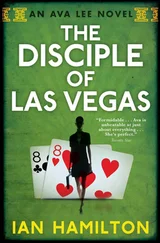Stephen Coonts - The Disciple
Здесь есть возможность читать онлайн «Stephen Coonts - The Disciple» весь текст электронной книги совершенно бесплатно (целиком полную версию без сокращений). В некоторых случаях можно слушать аудио, скачать через торрент в формате fb2 и присутствует краткое содержание. Жанр: Триллер, на английском языке. Описание произведения, (предисловие) а так же отзывы посетителей доступны на портале библиотеки ЛибКат.
- Название:The Disciple
- Автор:
- Жанр:
- Год:неизвестен
- ISBN:нет данных
- Рейтинг книги:4 / 5. Голосов: 1
-
Избранное:Добавить в избранное
- Отзывы:
-
Ваша оценка:
- 80
- 1
- 2
- 3
- 4
- 5
The Disciple: краткое содержание, описание и аннотация
Предлагаем к чтению аннотацию, описание, краткое содержание или предисловие (зависит от того, что написал сам автор книги «The Disciple»). Если вы не нашли необходимую информацию о книге — напишите в комментариях, мы постараемся отыскать её.
The Disciple — читать онлайн бесплатно полную книгу (весь текст) целиком
Ниже представлен текст книги, разбитый по страницам. Система сохранения места последней прочитанной страницы, позволяет с удобством читать онлайн бесплатно книгу «The Disciple», без необходимости каждый раз заново искать на чём Вы остановились. Поставьте закладку, и сможете в любой момент перейти на страницу, на которой закончили чтение.
Интервал:
Закладка:
Davar shivered, then pulled the window closed.
She turned-and a gloved hand was clapped over her mouth as she was seized roughly.
Panic swelled, and she tried to struggle against the overwhelming strength that imprisoned her. She could taste the leather of the glove on the hand over her mouth. Recovering from her momentary terror, she ceased struggling… and felt the pressure of the hand over her mouth lessen.
“I didn’t think you were a screamer.” A male voice, whispering in English. American English.
She recognized the voice. It was that spy, Carmellini.
She saw him in a lightning flash, dressed all in black, towering above her, a shadowy, damp presence, his strength still immobilizing her.
Now the hand over her mouth came away.
“Is there anyone else on this floor?”
“No.”
“Can we be overheard?”
“I don’t think so.”
He released her from his grasp and retreated, a dark shape in a darker room. When the lightning flashed and the thunder boomed again, she saw that he had taken off the black hood that covered his head, and he was smiling.
“Sorry to drop in on you like this, but getting a date in this town is just impossible.”
Finding the Ghobadi house in the toniest neighborhood of Tehran with the help of a GPS hadn’t been difficult. Deciding which room to enter had been dicier, and I finally settled on the attic. My night vision goggles, which used both starlight and infrared, helped ensure I wasn’t going to stumble onto a guard in the yard or climb through a window onto an occupied bed.
She was wearing only shorts and a T-shirt, and Muslim or not, she didn’t seem embarrassed by my presence. I remarked on that as she lit a cigarette and puffed nervously.
“I had a boyfriend,” she told me by way of explanation. “When I was in England. He was from Oklahoma.”
“Uh-huh.”
“I should have married him.”
“Why didn’t you?”
“My mother was ill. When I got my degree, I came home to take care of her. She died last year.”
While she was talking, I was scoping out the room, which was large. Apparently she had most of the attic, or all of it. Large tables held blueprints. I looked them over with my penlight while she told me about mullahs, life in Iran and the life she had had in England.
“What are these?”
“Construction projects my father’s company is building.”
“Why do you have them?”
“I check the math for him. Sometimes his engineers make mistakes.”
“And you don’t?”
“Not with numbers.”
“May I photograph these?” I asked.
“If you wish,” she said. She seemed to have no problem betraying the mullahs.
She segued right into politics and nuclear weapons while I rigged blankets over the windows, the one I had entered and another on the opposite side of the room, then turned on every light in the place.
Old-time spies used Minox cameras, but my agency had gone digital. I got out my Sony Cyber-shot, which was perfect for this use; just lay the document flat, focus and click.
“Are you married?” she asked.
I shot her a glance. She was trying to look nonchalant, and failing. “This year all the foreign spies are single.”
“Do you have a girlfriend?”
“I’m temporarily between,” I muttered as I repositioned blueprints.
“In England I had many boyfriends,” she said and slowly peeled off the T-shirt.
Uh-oh! It wasn’t enough I was in a Muslim woman’s bedroom photographing state secrets; now she was stripping down to her birthday suit.
I stopped taking pictures and took the memory card out of the camera. Meanwhile Davar was removing the shorts. Well, she was a woman, all right.
I dug in my backpack and got out the satellite burst transmitter. Somehow I managed to get the camera card in it, got the thing turned on and stuck it outside on the window ledge, all the while watching Davar pose on the back of a chair. I wasn’t nervous-I was terrified.
“Do you Iranians still stone sex fiends to death?” I asked her.
“You can kiss me if you wish,” she said and arched her back to display her breasts better.
“Tell me about this guy from Oklahoma.” I checked my watch. Another sixty seconds or so on the burst transmitter, which would erase the camera card after the transmission, then I was out of here.
“He wanted me to marry him.”
“Why didn’t you?”
“I had to return to Iran. I’ve told you that.”
“Write him a letter,” I said as I went around the room turning off lights. “Tell him you changed your mind. Women have the right, you know.” When the place was as dark as it was going to get, I pulled on my backpack.
I ran into her in front of the window. She wrapped her arms around me.
I thought, What the heck? and gave her a long kiss. Her lips and tongue tasted delicious. She pressed her naked body against me.
“Write him a letter,” I said huskily, pushing her away.
I pulled the blanket down and pulled on my night vision goggles. No one in sight. I retrieved the burst transmitter from the window ledge, then eased out the window and felt for the handholds I had used to climb up.
Davar Ghobadi stood at the window until Tommy Carmellini reached the ground and disappeared into the night. One instant he was there, then he was gone, swallowed by the darkness.
She went back to bed, but sleep wouldn’t come.
Her thoughts were still tumbling about-Tommy Carmellini, Iran, mullahs, nuclear weapons, Ghasem, Azari-when she finally drifted off to sleep.
CHAPTER SEVEN
Ghasem’s uncle Habib Sultani was a harried man. His afternoon interview with President Mahmoud Ahmadinejad did not go well. The president had just publicly reissued his call for the dissolution of Israel, peacefully or violently, which had boosted his and Iran’s status in the Muslim world to giddy new heights, as he had intended, and had caused temblors to once again rock Western capitals. Today Ahmadinejad was suffused with enthusiasm over reports of his speech from Arabia, Syria, Libya, Yemen and certain quarters in Palestine, Jordan, Egypt and Pakistan. His face seemed to glow.
“We play a dangerous game,” Sultani said bluntly to the exultant president when they were alone. “The Israelis and Americans know about our missiles. They know of their capabilities and their location. They know the design and location of the reactors to the precise inch. They could destroy the reactors and all our nuclear facilities aboveground with impunity, as they did the Syrian reactor. Our antiaircraft defenses are no better than the Syrians’.”
Ahmadinejad did not appreciate hearing the bald truth. He was a man who believed firmly in Allah and himself, although there were some who privately said that the order was reversed. “The Americans are great cowards,” he declared, and not for the first time. “They have announced to the world that they do not believe we have a weapons program. Yet they know that we are enriching uranium, and they know that an attack will release large quantities of radioactivity. They fret about poisoning the earth and wring their hands like old women.”
“The possibility of radioactive contamination didn’t stop the Israelis,” Sultani noted.
“Ah, yes, the Jews,” Ahmadinejad said. “Infidels without scruples.”
The irony of Ahmadinejad’s comment did not escape Sultani, who had yet to observe a scruple in the president of Iran.
Mahmoud Ahmadinejad spoke as if God were whispering in his ear. “The godless Americans will do nothing-nothing-and they will not provide assistance to the Israelis. Without American airborne tanker assets, Iran is out of range of Israeli bombers.”
Once again Sultani was left to contemplate the carnage caused by the incompetence of the American CIA, which had agreed with the publicly issued National Intelligence Estimate that said Iran had discontinued its nuclear weapons program. He knew that the separation of weapons-grade plutonium from enriched uranium had never stopped-in fact, the man in charge of that effort worked for him. He also knew that the nation possessed enough plutonium to manufacture twelve bombs, and that the stockpile was growing at several kilos per month. Never, he thought, in the history of the world had a foreign intelligence estimate been seized upon with such glee.
Читать дальшеИнтервал:
Закладка:
Похожие книги на «The Disciple»
Представляем Вашему вниманию похожие книги на «The Disciple» списком для выбора. Мы отобрали схожую по названию и смыслу литературу в надежде предоставить читателям больше вариантов отыскать новые, интересные, ещё непрочитанные произведения.
Обсуждение, отзывы о книге «The Disciple» и просто собственные мнения читателей. Оставьте ваши комментарии, напишите, что Вы думаете о произведении, его смысле или главных героях. Укажите что конкретно понравилось, а что нет, и почему Вы так считаете.












